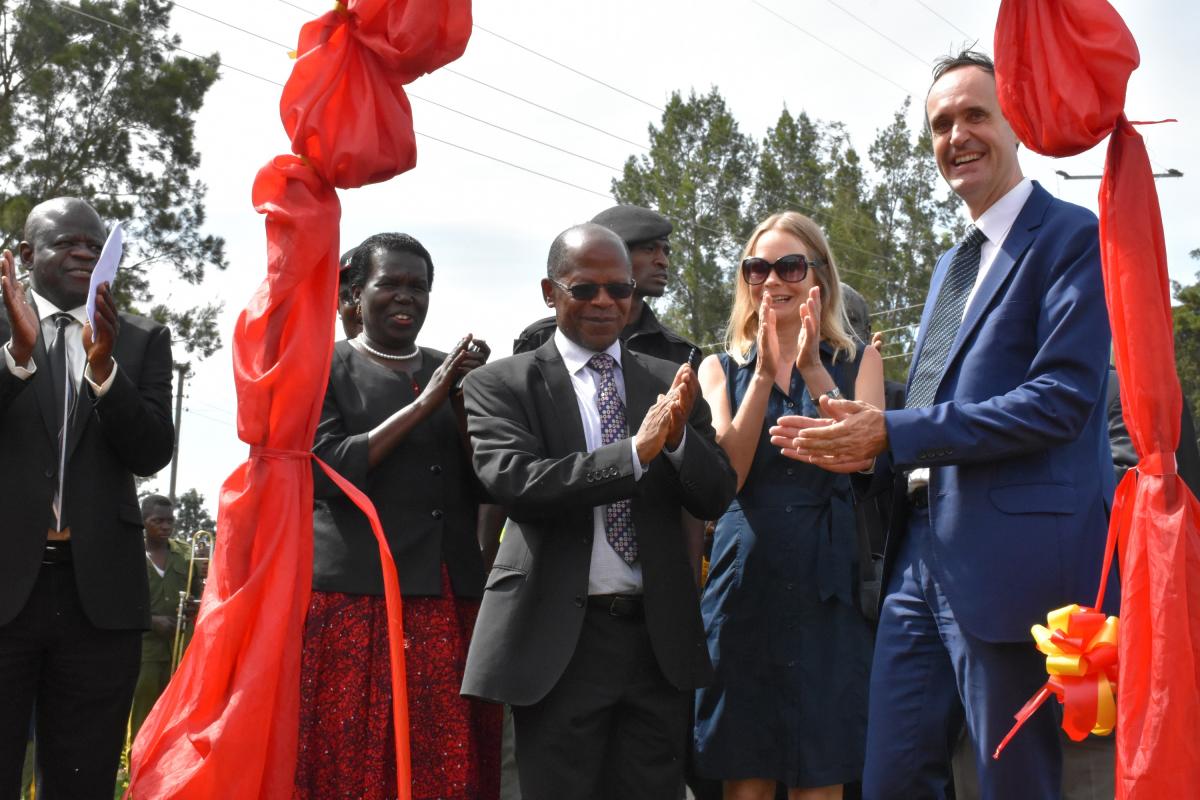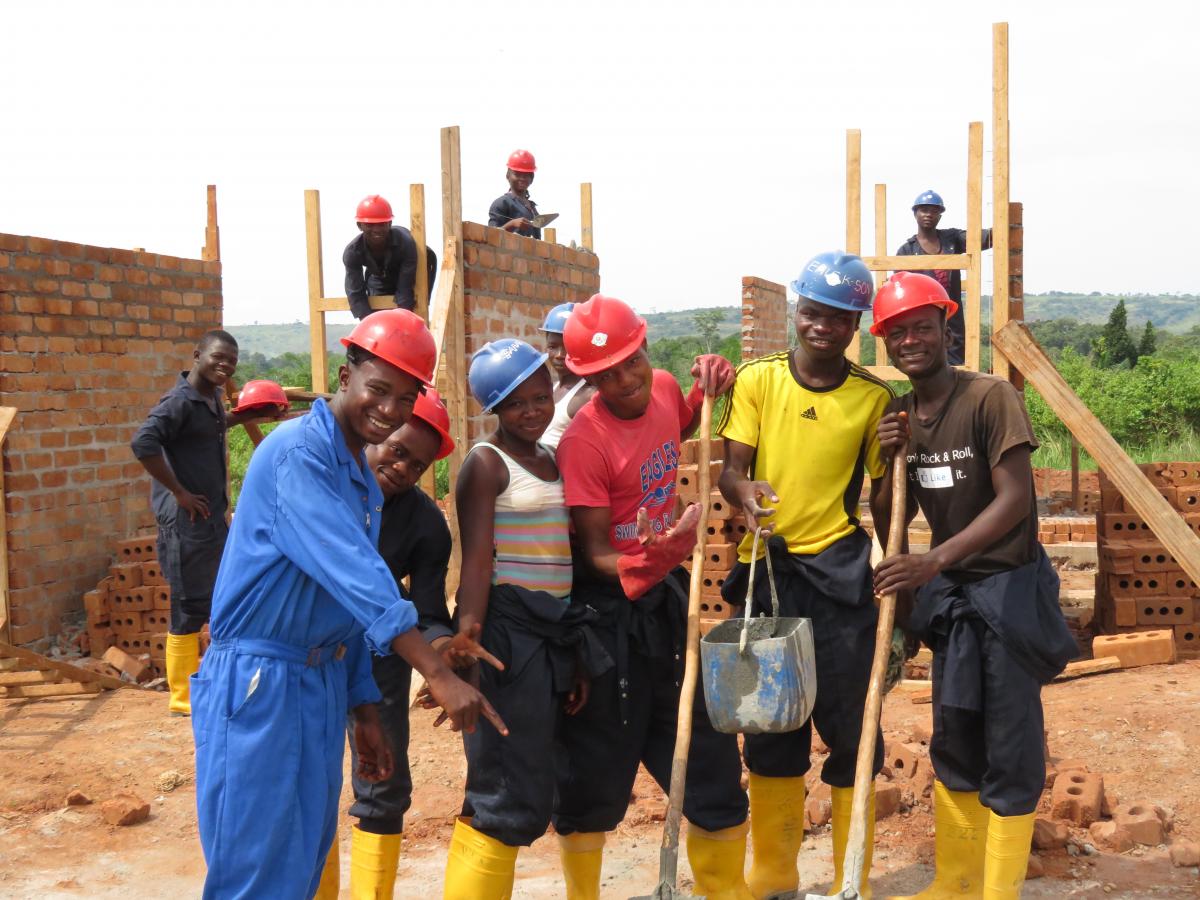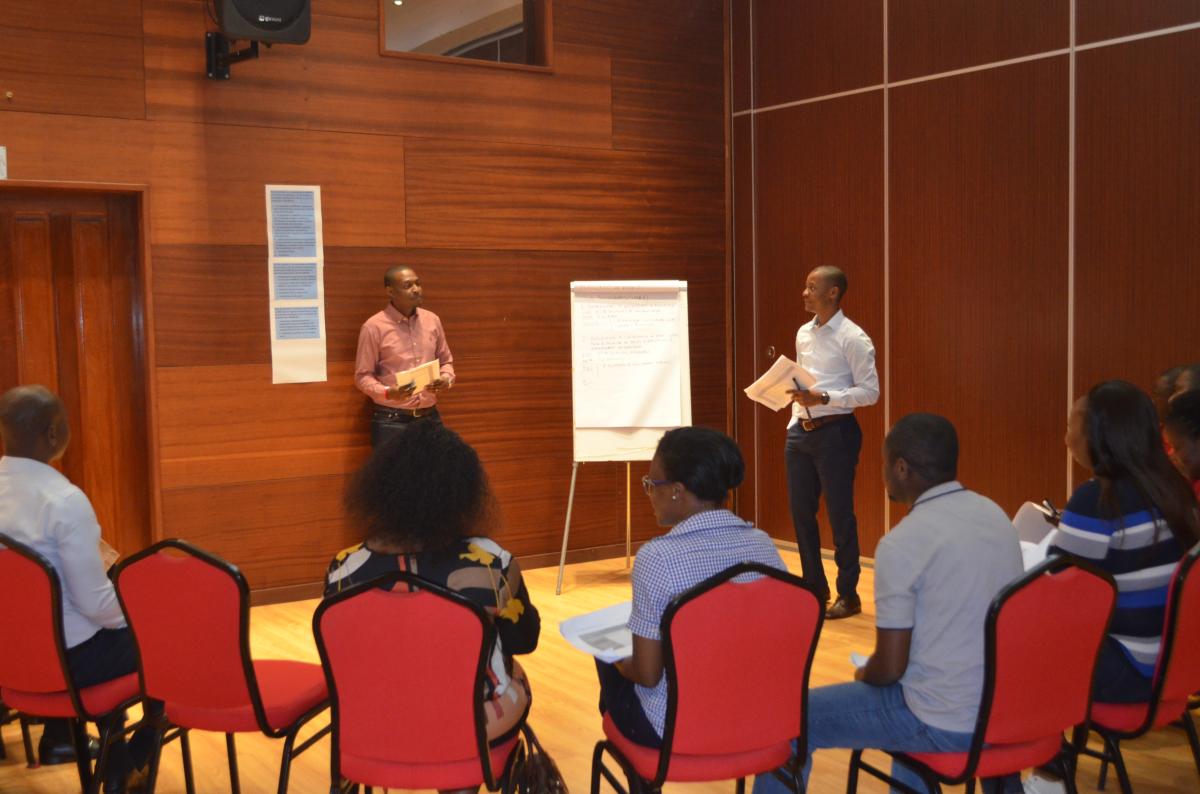Rechercher
Affichage de 1815 à 1830 sur 2520 actualités
-
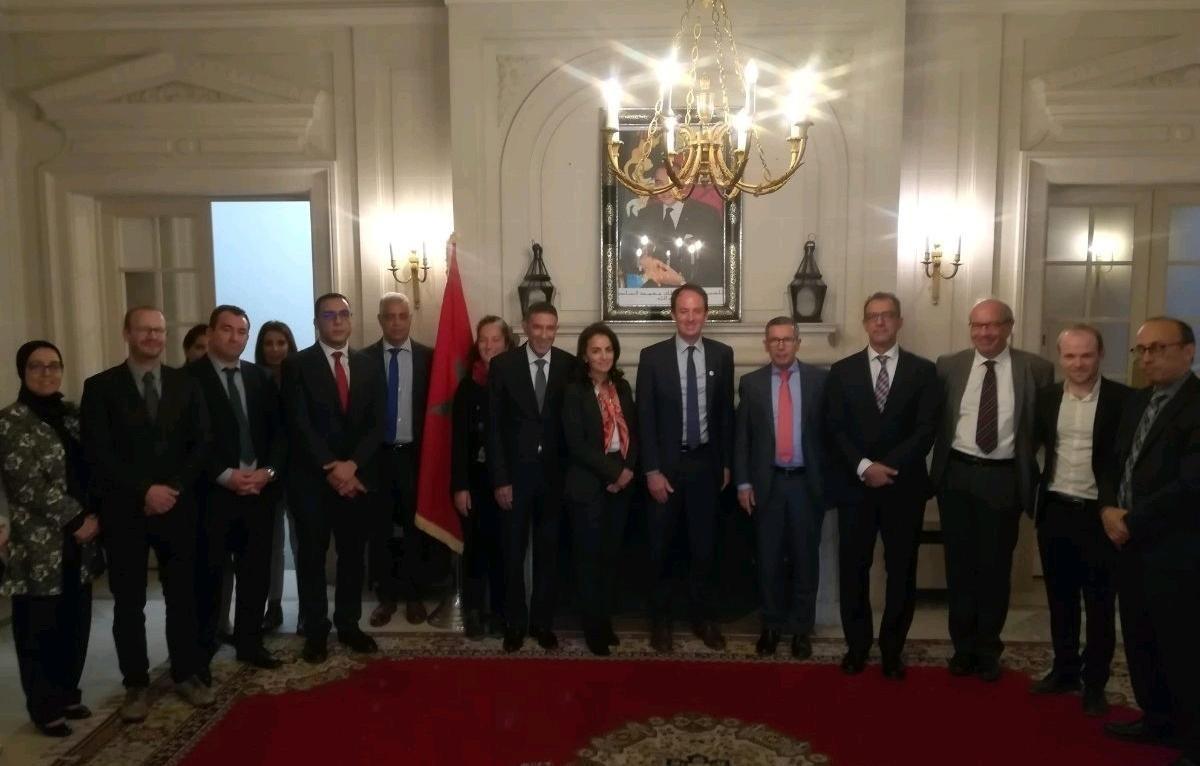
Les MeM belges au centre des priorités de la coopération maroco-belge.
Said SAHLI | 27/12/2018
Les partenaires de l’intervention Maghrib Belgium Impulse (MBI) visent à créer un espace de concertation et de collaboration impliquant plusieurs acteurs gouvernementaux marocains et belges, ainsi que des acteurs clés du monde des affaires, permettant ainsi de mobiliser durablement les compétences des Marocain·e·s résidant en Belgique et de les accompagner à lancer des investissements productifs et à haut potentiel de succès pour le développement du Maroc. C’est dans ce sens que s’est tenu à Bruxelles, en octobre dernier, un atelier d’échange institutionnel regroupant les principaux acteurs impliqués dans cette intervention, à savoir les représentants du Ministère délégué auprès du Ministre des Affaires Etrangères et de la Coopération Internationale Chargé des Marocains Résidant à l'Etranger et des Affaires de la Migration, les représentants du Corps Diplomatique du Maroc en Belgique, l’équipe d’Enabel au Maroc et à Bruxelles et les représentants de la Direction générale Coopération au Développement et Aide humanitaire (DGD) en Belgique. Cet atelier a été présidé par Son Excellence Monsieur l’Ambassadeur du Maroc en Belgique, Mohammed AMEUR, et par Monsieur Jean VANWETTER, Directeur général de l’Agence belge de développement-Enabel.
-
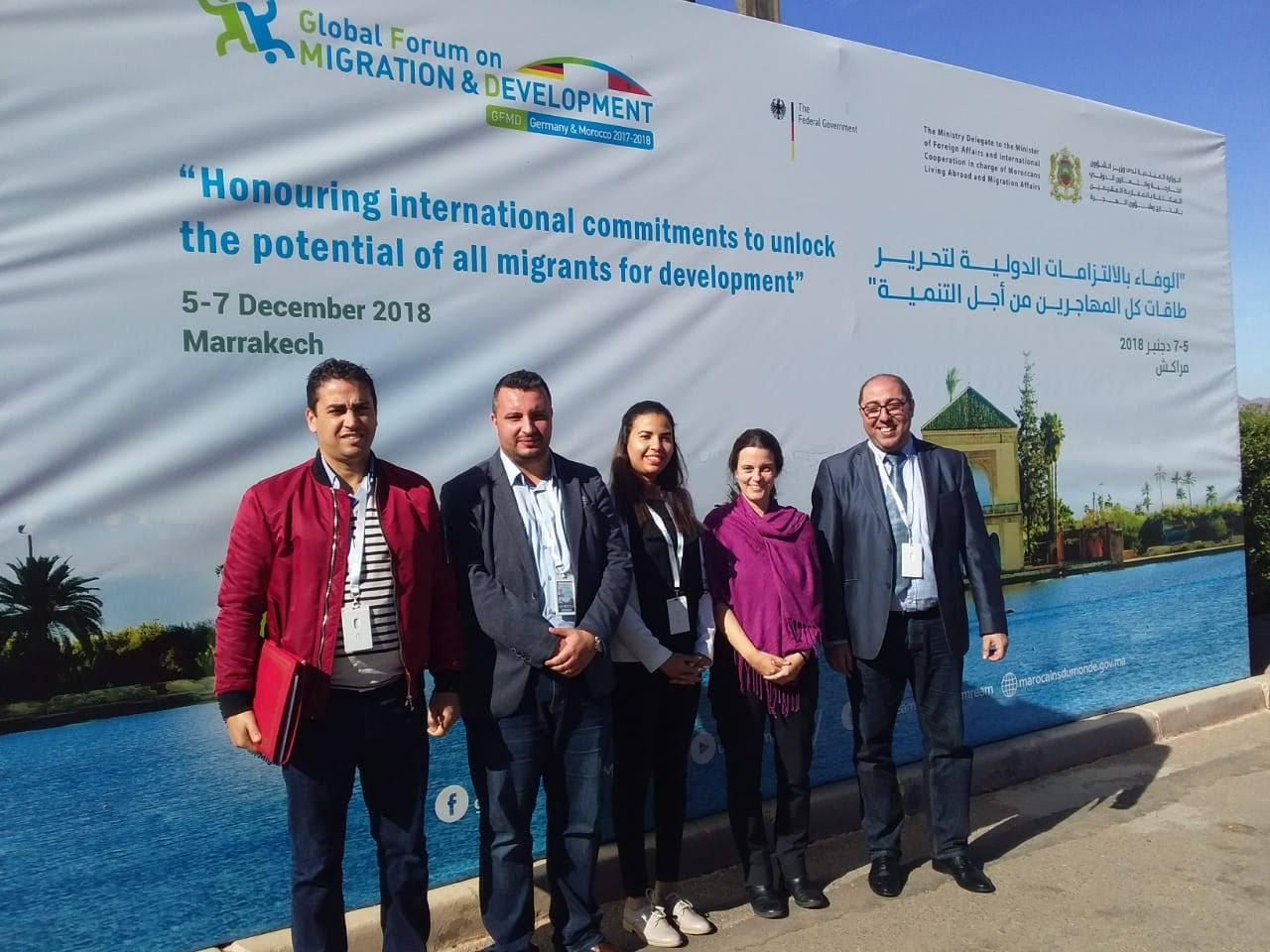
Au Forum Mondial pour la Migration et le Développement (GFMD).
Said SAHLI | 27/12/2018
Des membres de l’équipe du « Programme d’appui à la gestion de la thématique migratoire (Programme Migration) » de la coopération belgo-marocaine ont participé aux travaux de la 11ème édition du Forum Mondial pour la Migration et le Développement (GFMD) qui s’est déroulé à Marrakech du 5 au 7 décembre 2018. Le GFMD est la plus importante plateforme internationale de discussion sur les thématiques de la migration et le développement. Il a pour objectif de promouvoir l’échange d’expériences et la coopération sur ces deux thématiques entre les Etats et les autres parties prenantes telles que les organisations internationales, le secteur privé et les ONGs. La 11ème édition s’est tenue sous le thème général : « Honorer les engagements internationaux pour libérer les potentialités des migrants pour le développement ». Elle a battu un record en termes de nombre de participants et de délégations internationales ayant pris part à ses travaux. Des personnalités éminentes y étaient présentes. Elles représentaient le secrétariat des Nations Unies, des organisations du système onusien concernées par la migration, des délégations nationales et internationales représentant des Etats, des organismes de la coopération internationale, le secteur privé et des organisations de la société civile.L’édition de Marrakech a eu la particularité de s’être tenue à la veille de la conférence intergouvernementale pour adopter le Pacte mondial pour des migrations sûres, ordonnées et régulières, qui a eu lieu les 10 et 11 décembre dans la même ville. Les travaux du forum se sont déroulés sous forme d’une quarantaine de tables rondes, sessions et side-events et ont porté sur trois thèmes principaux :De la vulnérabilité à la résilience : reconnaître le rôle des femmes et des hommes migrants en tant qu'agents du développement.Favoriser la mobilité régionale pour promouvoir l’apprentissage transférable et la cohérence des politiques.Mettre en place une bonne gouvernance de la migration pour un développement durable. Pour plus d’information, veuillez consulter le site officiel du GFMD : https://gfmd.org/
-
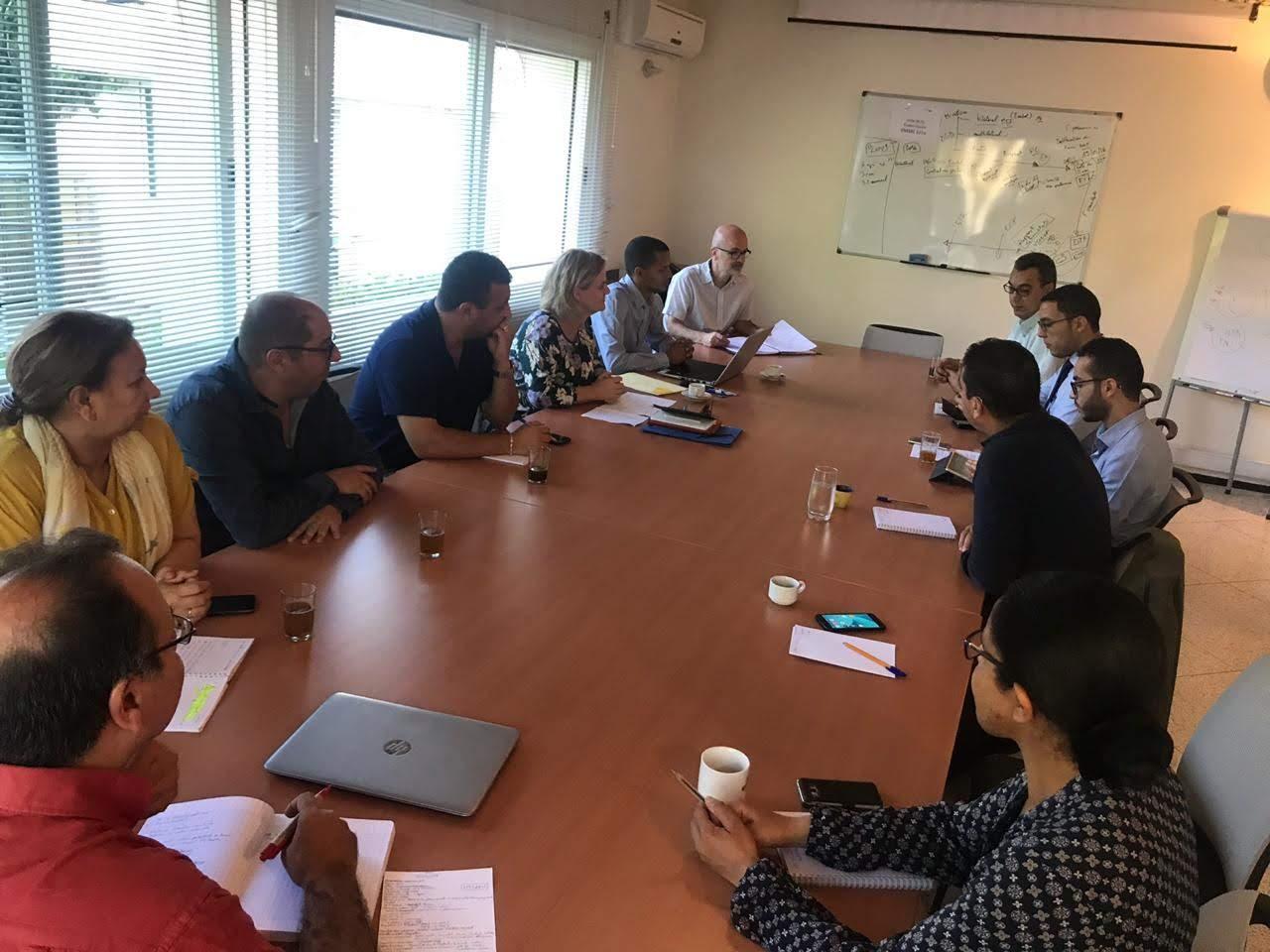
VDAB et les partenaires d'Amuddu identifient les axes de collaboration
Said SAHLI | 27/12/2018
Dans le cadre du projet « Amuddu : Appui à la mise en œuvre de la Stratégie Nationale d’Immigration et d’Asile (SNIA) », le service d’emploi public de la Flandre (VDAB) assurera un appui technique pour la mise en œuvre de certaines activités prévues visant l’intégration économique des personnes migrantes. Afin de détailler de manière conjointe les axes de collaboration entre cette institution belge et les partenaires du projet Amuddu -notamment, le Ministère délégué auprès du Ministre des Affaires Etrangères et de la Coopération Internationale Chargé des Marocains Résidant à l'Etranger et des Affaires de la Migration (MDCMREAM), l’Entraide Nationale et l’ANAPEC-, une première mission exploratoire a eu lieu du 24 au 28 septembre au Maroc.Avec un emploi de temps chargé, les représentants de VDAB ont pu échanger avec les institutions marocaines afin de mieux connaitre leur travail et leurs défis, ainsi que les opportunités de collaboration. Cette visite a été l’occasion également de rencontrer d’autres partenaires d’Enabel dans le cadre du « Programme d’appui à la gestion de la thématique migratoire » et d’autres acteurs clés dans le domaine, à savoir, la CGEM, l’Union Européenne ou l’Organisation Internationale pour les Migrations (OIM). Cette mission a permis aux experts d’analyser les outils, le processus et les besoins des partenaires afin de proposer des recommandations suivant leurs expériences dans le domaine.
-
PROMOVIENDO LA FORMACIÓN DE SERVIDORES PÚBLICOS BAJO UN ENFOQUE DE DESPATRIARCALIZACIÓN, COMPROMETIDOS POR LA IGUALDAD
Agar TAMAYO | 24/12/2018
Grupo de Campeones y Campeonas por la Igualdad de Género y la Despatriarcalización. El Estado Plurinacional de Bolivia se ha dotado de un marco normativo ejemplar para los derechos de las mujeres. La Constitución Política del Estado de 2009 reconoce la igualdad entre hombres y mujeres y penaliza la violencia por motivos de género. En los últimos años el Estado ha promulgado varias leyes¹ para implementar esta visión de lucha contra las prácticas patriarcales. La alta participación de las mujeres en el poder legislativo es sin duda un ejemplo a seguir en la región, así como los avances registrados en el acceso a la educación de las mujeres. Sin embargo, aún persisten las desigualdades y estas mantienen prioritariamente un rostro de mujer, indígena y de la zona rural. La Agenda de Despatriarcalización presentada el 11 de octubre, otorga un nuevo marco para mantener los derechos ganados y avanzar en reducir las brechas de desigualdad. La siguiente propuesta retoma las conclusiones de los ejes 2 y 3 de la Agenda de Despatriarcalización e inicia el proceso de fortalecimiento de los funcionarios públicos del nivel central para la Despatriarcalización. Con esta propuesta se da un primer paso en este fortalecimiento, que se mantendrá de forma anual a través del CIAG en articulación con otras aliadas como la Plataforma de Justicia Fiscal Desde las Mujeres, y en coordinación con el Ministerio de Planificación, el Ministerio de Justicia a través del VIO y la Asamblea Legislativa Plurinacional. Resultados Esperados:- Fortalecimiento de las capacidades de planificación con enfoque de Despatriarcalización e igualdad de los directores de planificación y personal clave en los ministerios. - Conformación de un equipo de Campeones y Campeonas por la Despatriarcalización y la Igualdad. Participantes Directores/as de Planificación y personal clave de los Ministerios de Justicia, Educación, Salud, Comunicación, Economía y Finanzas Publicas, Gobierno, Relaciones Exteriores, Desarrollo Rural y Tierras, Desarrollo Productivo y Economía Plural, Medio Ambiente y Agua, Trabajo, Deportes, Planificación del desarrollo, Cultura, INE y Vice Presidencia. Las organizaciones del CIAG y aliados que auspiciaron este evento fueron: Cooperación Técnica Belga en Bolivia CTB/ENABEL, Embajada de Canadá, Naciones Unidas, Unión Europea, la Embajada de Suecia y la Plataforma de Justicia Fiscal desde las Mujeres y el Centro de Promoción de la Mujer Gregoria Apaza.
-
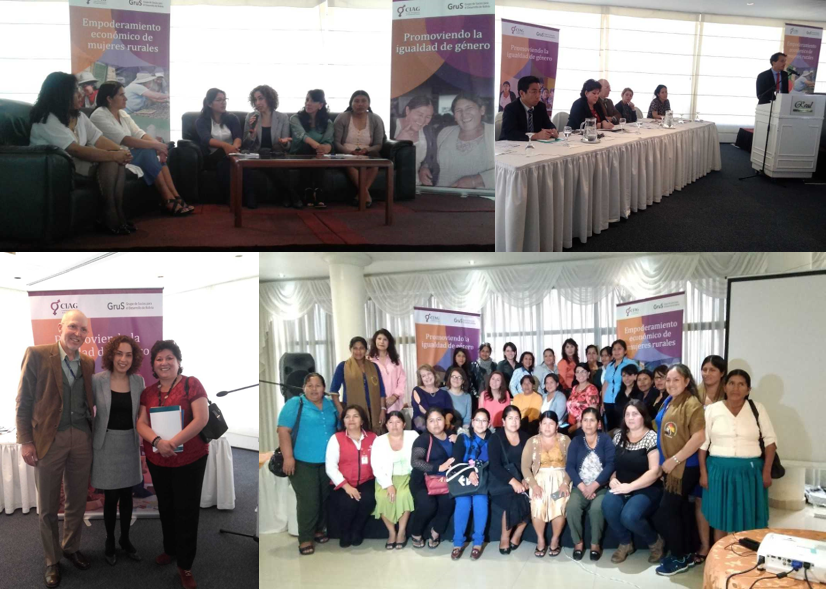
CONVERSATORIOS: DESAFÍOS Y OPORTUNIDADES PARA EL EMPODERAMIENTO ECONÓMICO DE LAS MUJERES Y LAS NIÑAS RURALES, HACIA EL LOGRO DE LA IGUALDAD DE GÉNE
Agar TAMAYO | 24/12/2018
Los conversatorios fueron realizados en las ciudades de Cochabamba (24 de octubre), Chuquisaca (26 de octubre) y La Paz (30 de octubre) de 2018, organizado por el Comité Interagencial de Asuntos de Género (CIAG), un subgrupo temático del Grupo de Socios para el Desarrollo de Bolivia – GRUS, creado en 1995 en el marco de la IV Convención Mundial sobre las mujeres en Beijing. El CIAG trabaja en 3 líneas estratégicas denominadas: a) Lucha contra la violencia machista b) Promoción de la igualdad de género en la gestión pública c) Empoderamiento económico de las mujeres Los conversatorios fueron realizados en conmemoración del Día de la mujer boliviana y Día internacional de la niña (11/10/2018), asimismo el Día internacional de la mujer rural (15/10/2018).Los (3) eventos forman parte de la tercera línea estratégica del CIAG, enfocada en promover un espacio de diálogo y reflexión en torno a los desafíos y oportunidades para lograr la igualdad de género y el empoderamiento de las mujeres y las niñas rurales y sus derechos humanos, considerando las dimensiones de lo social, económico y ambiental, así como los niveles de acceso y control a los factores tierra, agua, recursos naturales y otros recursos productivos relacionados con el crédito y otros financiamientos. Las organizaciones internacionales que auspiciaron este evento fueron: Cooperación Técnica Belga en Bolivia CTB/ENABEL, Embajada de Canadá, FAO, PMA, ONU MUJERES, JICA, Unión Europea, la Embajada de Suecia y la Cooperación Suiza en Bolivia.En Bolivia, la filosofía del Vivir Bien es un paradigma de desarrollo que representa los valores de la solidaridad, la equidad, la colaboración y la justicia desde una visión integral y armónica con el medio ambiente. En su esencia, comprende los principios y objetivos del enfoque de género que busca revertir las desigualdades históricas entre hombres y mujeres, asentadas en diferencias biológicas que se han transformado social y culturalmente en jerarquías, discriminación, exclusión y violencia.Los conversatorios se enmarcaron en los desafíos planteados en la Agenda Patriótica 2025 con los 13 pilares fundamentales y la Agenda de Desarrollo Sostenible 2030 con sus 17 Objetivos de desarrollo sostenible (ODS), y en específico el ODS 5 enfocado hacia la Igualdad de Género; así como en las recomendaciones de la reunión la Comisión de la Condición Jurídica y Social de la Mujer (CSW62) realizada en Nueva York en el mes de marzo de 2018. La Cooperación internacional viene trabajando la temática de género hace más de veinte años, abordando diferentes aspectos concernientes al rol de la mujer y sus necesidades, en un entorno cada vez más dinámico que exige planteamientos innovadores y efectivos, por lo que el intercambio de experiencias por parte de las diferentes agencias se convierte en una fuente importante de recursos y mecanismos inclusivos para el empoderamiento de la mujer de manera general y específicamente en este caso, de la mujer rural.Es un esfuerzo realizado en el marco del liderazgo y coordinación de la CTB/Enabel en el CIAG en la gestión 2018
-

MUJER, NIÑA Y AGUA (PROYECTOS SOCIO-COMUNITARIOS PRODUCTIVOS EN EL CUIDADO DE LAS CUENCAS CON ENFOQUE DE GÉNERO)
Agar TAMAYO | 24/12/2018
La experiencia denominada Mujer, Niña y Agua nace como resultado del diagnóstico con enfoque de género, efectuado en Guardaña en el que se identificaron acciones que debían ser realizadas con el objetivo de promover los liderazgos y acciones para el empoderamiento de las mujeres que viven en las microcuencas. En este espacio se formaron lideresas, comprometidas en generar procesos de capacitación, de compartir sus aprendizajes y experiencias con sus pares sobre el reconcomiendo de sus derechos sobre la igualdad de género. De esta manera, se conoció a la lideresa Saavedra Ordoñez quien acompaño en la construcción de esta buena práctica. Esta iniciativa fue desarrollada por Ministerio de Medio Ambiente y Agua (MMAyA) a través del Programa Intercultural Cuencas Pedagógicas, con el apoyo de la Cooperación Técnica Belga en Bolivia CTB/ENABEL a través del Proyecto Apoyo en Experticia, Estudio y Asistencia Técnica al sector Agua y Medio Ambiente – PAERE, y el Proyecto Gestión Integral del agua de Helvetas -Cooperación Suiza en Bolivia, el mismo que promovió el ejercicio de la igualdad de género desde la gestión de cuencas en Proyectos Socio Comunitarios Productivos (PSP), con acción directa en unidades educativas.Los resultados obtenidos fueron: 138 docentes capacitados, informados y sensibilizados en la gestión de cuencas con enfoque de género; más de 3.000 alumnas y alumnos de 15 unidades educativas situadas en 12 municipios sensibilizados en las temáticas. La participación de las mujeres lideresas en procesos de capacitación fue fundamental para el encuentro entre pares.
-

Un atelier de formation sur l’électrification solaire et le pompage photovoltaïque
Meriem HILALI | 19/12/2018
Un atelier de formation sur « les énergies renouvelables et l’efficacité énergétique au service de l’électrification décentralisée et le pompage solaire en Afrique » a débuté lundi, à Marrakech, avec la participation d’une vingtaine de bénéficiaires du Togo, du Sénégal et de la Mauritanie issus du secteur privé, public et du monde associatif. Et ce dans le cadre du Fonds d’Appui à la coopération triangulaire (Maroc-Belgique-autres pays africains). L’objectif du Fonds, mis en œuvre par l'Agence Marocaine de Coopération Internationale et Enabel, est de promouvoir des actions et des échanges dans les domaines de la formation et du transfert du savoir-faire pour l’amélioration des compétences des ressources humaines des pays d’Afrique subsaharienne.
-

Capitalisation : Communication de proximité au service des projets de l’assainissement liquide
Meriem HILALI | 18/12/2018
Entre 2012 et 2018 l'Appui au Programme National d’Assainissement Liquide a été mis en oeuvre par l'Office National de Electricité de l'Eau potable et Enabel, en partenariat avec un consortium de bailleurs de fonds Européens à savoir: Union européenne au Maroc , AFD - Agence Française de Développement, KFW Bankengruppe, @BEI et la coopération Belge.Aujourd'hui le 18 décembre 2018, un important séminaire de capitalisation a eu lieu à Rabat au sein de l'ONEE en présence de toutes les parties prenantes et les intervenants dans le domaine de l'eau, l'assainissement et la coopération au développement au Maroc.Découvrez avec nous le Best-Of du film de capitalisation de l'Appui au Programme National d'Assainissement Liquide #APNA
-
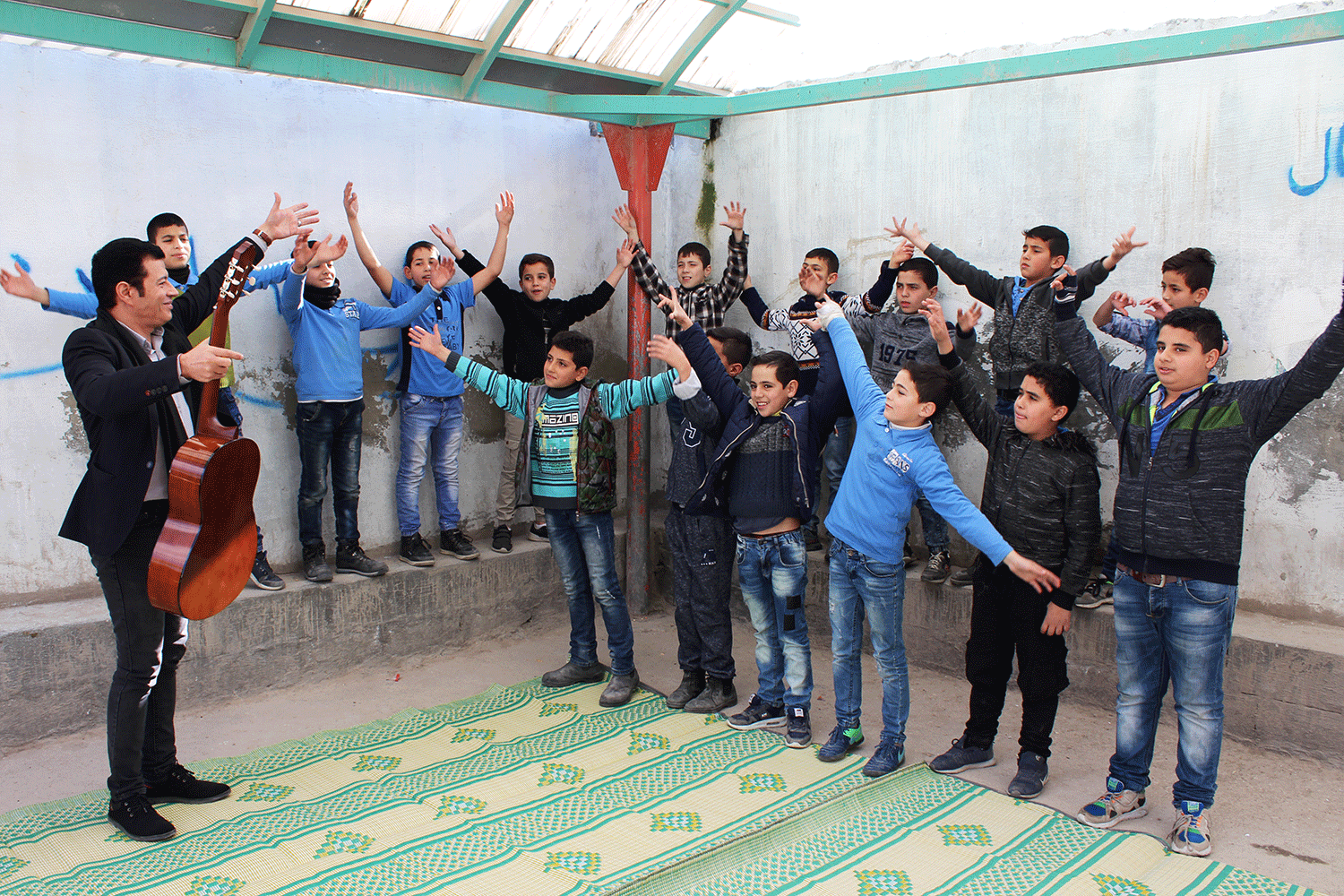
Celebrating the Universal Declaration of Human Rights in Palestinian schools
Laura SCHILLEMANS | 18/12/2018
The Belgian Consulate organized events in Palestinian schools to commemorate the 70th anniversary of the Universal Declaration of Human Rights; together with partner organizations.OHCHR went to Khan Younis, Gaza, to work with a class of girls at the UNRWA Al-Amal school around their ideas about and experiences with the Universal Declaration of Human Rights. A lively moment filled with discussions, poems, dances and songs.At the Khadeja primary boys school (Hebron H2), NRC and the Consulate General of Belgium met with Palestinian children to discuss human rights. Mohammed (* alias name) described how he was detained by soldiers on his way to school, and wet himself out of fear. Since then, Mohammed is showing signs of withdrawal and learning difficulties. Together with the students, they talked about the right to education and a safe learning environment. At Sharek Youth Forum in Ramallah, UNFPA Palestine, the Consulate General of Belgium and Palestinian youth discussed the right to education, the right to marry and the right to a nationality. Unicef's Deputy Special Representative, Ms. Etona Ekole, and the Consulate General of Belgium discussed human rights with children of a school near Bethlehem, such as the right to education, as outlined in the UDHR. Terre Des Hommes went to Zayyam in East-Jerusalem to work with students to express their ideas about human rights in a play, paintings and songs.Later, students of the schools also had the opportunity to talk about their experiences at the Belgian Residence.
-
New Construction and Renovation Works Start at the National Teachers' Colleges
Dorothy KYAMAZIMA | 17/12/2018
The Government of Uganda together with Enabel (the Belgian development agency) have set aside a total of 12m euros (about shs.50b) for the rehabilitation and construction of the five National Teachers’ Colleges in the country. The colleges include NTC Kabale, NTC Mubende, NTC Kaliro, NTC Unyama and NTC Muni. The project will see the construction of new staff houses, dispensaries, early childhood learning centers, boys' and girls' dormitories, toilets and renovation of some existing blocks. Other facilities include electrical strengthening of science blocks, solar power for the existing bio-gas pumps, improving the solar security lighting and landscaping. Speaking during the ground-breaking ceremony to kick start construction works in the five colleges, the Minister of State for Higher Education, Dr John Chrysostom Muyingo, said the move is aimed at strengthening teacher education in the country. "Teacher education is one of the strategic priorities of the education sector. In order to improve learning outcomes for all Ugandan students, teacher training education is the first step,” Muyingo said.He said rehabilitation and construction works at the Muni and Kaliro would focus mainly on improving the living quarters of both staff and students. While at Kabale and Mubende, the focus will be on the administration and classroom blocks. The infrastructural works will take a maximum of 18 months. Muyingo urged the contractors at all the sites to exercise maximum discipline and observe safety codes, especially because colleges will continue with their usual programmes. Muyingo said with a good teaching and learning environment, quality teacher educators and availability of relevant equipment, the country is sure of producing quality teachers. The minister of state for Higher Education, lauded the construction management unit of the education ministry as well as Enabel for ensuring the successful start of the construction phase of this project. The contractors included Sumadhura Technologies Ltd (NTC Muni-Northern Wing), Ambitious Construction Company Ltd (NTC Muni-Southern Wing), Complant Engineering and Trade Uganda Ltd (NTC Kaliro), Excel Construction Uganda Ltd (NTC Kabale) and Davrich Company Ltd (NTC Mubende). The Belgium Ambassador to Uganda, H.E Hugo Verbist said teachers form undoubtedly the most important building blocks in the education process of a young person because they directly facilitate the student’s learning experience. “Whether at primary, secondary or tertiary level, their role in the education cycle cannot be overstated. That is why the Belgian government since 2008 has concentrated on education and health,” he said. He said through this project, they are seeking to improve institutional management within National Teachers’ Colleges and address the infrastructural and pedagogical needs of both teachers and students.“Providing better teaching methods and continued professional development is one way to improve the learning outcomes. In order to do this, a safe and conducive learning environment is vital,” Hugo Verbist said. The Resident Representative of Enabel, Christelle Jocquet, said the launch of the construction works in the five colleges comes with intentions of creating sustainable and functional learning environments that will enhance the teaching and learning process. She said it was important that they continue to work together with government to address the critical barriers to achieving quality education for all, so that the country can have the learning outcomes that it is striving for. The Commissioner of TIET at the Ministry of Education and Sports, Dr. Jane Egau Okou, said upon completion, there would be betterment in training at the facilities, meaning the country would have a steady supply of good qualified teachers who will give learners meaningful education.
-
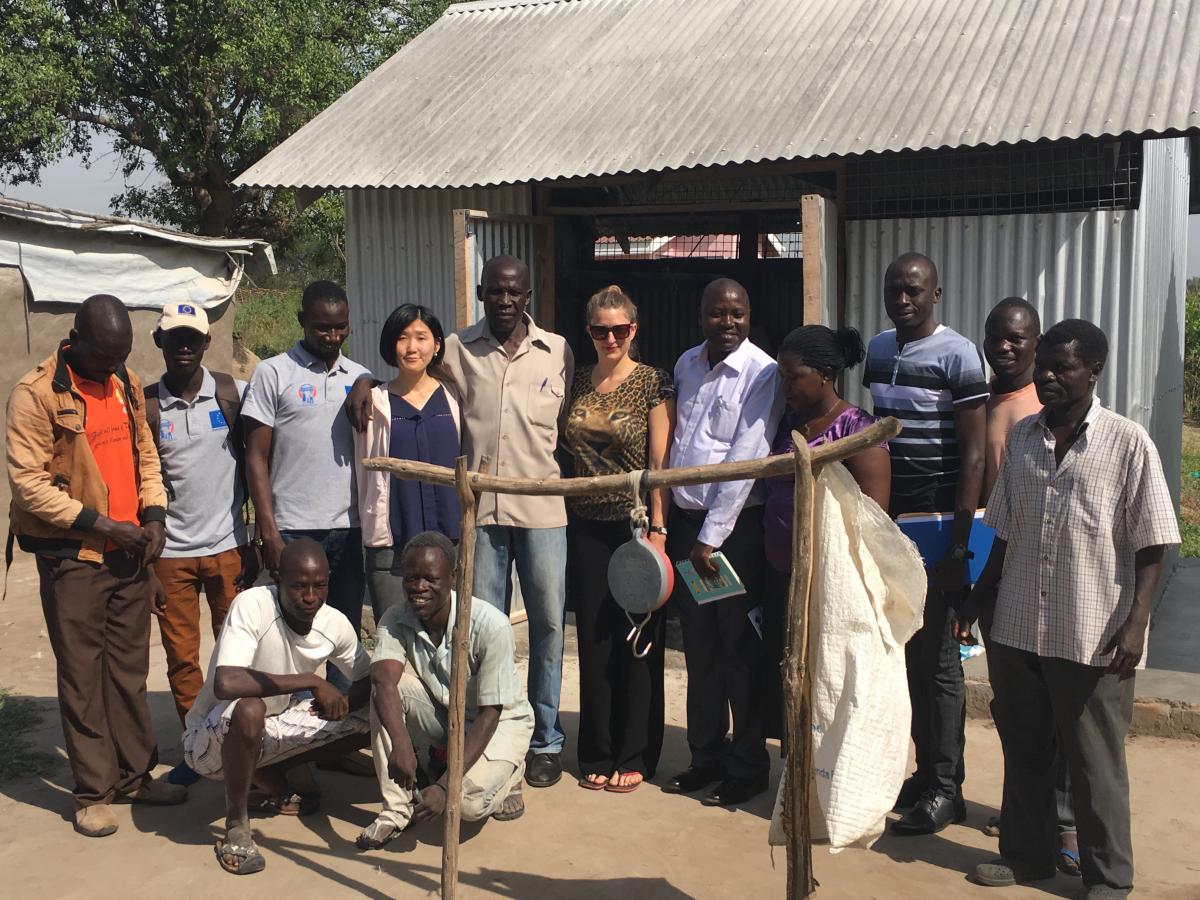
SPRS-NU hosts UNHCR team advancing Comprehensive Refugee Response Framework
Sylvia NABANOBA | 14/12/2018
The European Union Trust Fund’s (EUTF) Support Programme for Refugee Settlements in Northern Uganda (SPRS-NU) recently hosted a team from UNHCR, which is supporting governments to roll out the Comprehensive Refugee Response Framework (CRRF). The CRRF calls for greater support to refugees and the countries that host them. It specifies key elements for a comprehensive response to any large movement of refugees, which include rapid and well-supported reception and admissions; support for immediate and on-going needs; assistance for local and national institutions and communities receiving refugees; and expanded opportunities for solutions. The team, made up of Caroline Lensing-Hebben, the UNHCR CRRF Development Adviser in Geneva and three other members, was visiting programmes that have a close cooperation with the districts/governments in providing sustainable and comprehensive interventions; a strong support to host communities and activities with strong medium and long-term focus. The objective of the mission was to gather concrete examples and highlight how development partners contribute to the response. The findings are to be showcased by the UN High Commissioner for Refugees at the High Commission Dialogue on 18-19 December, 2018. The team visited the livelihood component of the SPRS-NU, implemented by CEFORD in Eden village, Rhino Camp refugee settlement, Arua district and two farmer field schools in Kiryandongo supported by Save the Children. They interacted with three farmer field schools; one in Arua called Awadifo (which means ‘thank you’ in the local language Lugbara) and Rubanga Wie Pe Will (which means ‘God Does Not Forget’ in the local language Acholi) and Kiryandongo Bee Keepers’ Association. Awadifo grows crops such as simsim, eggplant and cassava for promoting food security and runs a grinding mill received from CEFORD. Each month, the group earns about UGX1,700,000 (USD472) from the grinding mill. Lensing-Hebben appreciated the ability of SPRS-NU to impact lives through the household incomes and food security they are improving. The visitors also engaged with the conflict management component run by ZOA. They interacted with a local court in Eden village, Rhino Camp, which has members from both the local (Ugandan) councils as well as refugee welfare councils. These have formed a local court that mediates in conflicts and attempts to resolve cases. “We used to have very many conflicts between refugees as well as between refugees and nationals but they are now reducing since we were equipped with skills and knowledge on how to prevent and solve them,” said Samuel Albino, Chairperson of the Refugee Welfare Council in Eden village. “For those cases that we are not able to handle, we refer them to the higher authorities.” Lensing-Hebben was appreciative of the collaboration between refugee welfare councils and local councils. Visiting the Accelerated Education Programme (AEP) at Ofua Primary School in Arua District, the AEP learning centre headteacher greatly appreciated the EUTF-SPRS-NU interventions. The Accelerated Education Programme is a flexible, age-appropriate programme that brings back to school children who had dropped out. The school is a community one which does not get any funding from the Government – but is mainly supported by the community and non-governmental organisations. Save the Children has built a classroom block at the school and supports both South Sudan refugees and Ugandan nationals. In Kiryandongo, the team visited the WASH component of the programme. They saw a production well under construction by the Austrian Development Agency (ADA) and a water supply tank for both refugees and host communities. It was revealed that with the completion of the project there would be better access to safe water and the number of hours that girls/women spent in queues for water would reduce by more than four hours. The team wound up with a visit to the skills development and entrepreneurship component, implemented by Enabel, the Belgian development agency, through several grantees. The visit was to Flaminio Vocational Training Institute, in Arua, which, in partnership with Action Africa Help International Uganda, offers training in trades such as tailoring, catering, welding, bricklaying and construction for refugee and Ugandan youth. The visit also included a stop-over to students who underwent a six-month training at Welthungerhilfe’s Vocational Skills Centre in Siripi, Rhino Camp, and are now on internship with various private sector enterprises. Through internship, the students get exposure to the real place of work, business and entrepreneurial world. “I have learnt a lot from this tailoring workshop; now I can make all kinds of wares I learnt about in the training centre. I look forward to starting my own business,” said Jacob Akoy, an intern. “I saw a lot of positive impact,” said Lensing-Hebben. “I saw development and humanitarian partners coming together to create change for communities, working in partnership with the local government.” At a ‘meet-and-greet’ dinner for the team, the Deputy Chief Administrative Officer Arua district, Paul Samuel Mbiwa, said the district appreciates the support of the development partners for they are creating impact. “When we go on monitoring missions we can see that the refugees’ lives are changing through the SPRS-NU programme,” he said. He pledged the district’s support to ensuring that programmes succeed.
-
Adéquation formation-emploi « Chantier école »
Michael MALEMBA | 06/12/2018
L’approche « chantier école » est une modalité de formation en situation réelle de travail mise en place par le programme pour les travaux de construction et de réhabilitation des infrastructures des établissements ciblés. Le programme favorise l’insertion professionnelle d’un grand nombre de lauréats/sortants des établissements ciblés, tout en mettant l’accent sur l’insertion des filles. A l’issue du chantier école, ces lauréats/sortants bénéficieront de kits de sortie pour leur insertion professionnelle en vue de leur autonomisation sur le marché de l’emploi. 45 jeunes lauréats issus des filières de construction des établissements ciblés ont été sélectionnés pour la construction d’un dortoir d’une capacité de 120 lits en vue d’améliorer les conditions d’accueil et de logement des filles vulnérables. Il s’agit pour ces jeunes filles d’une occasion unique de bénéficier de formations aux métiers de la construction, au sein du Centre de formation professionnelle ELIKYA - GEMENA - province du SUD-UBANGI. Des artisans formateurs qualifiés dans la filière des métiers de la construction sont recrutés pour encadrer la pratique professionnelle de ces lauréats sur le chantier école. Ces travaux de construction se déroulent en deux étapes : d’une part, la fabrication des briques en terre stabilisée au ciment, (avec la presse à briques Terstaram), et d’autre part, la construction proprement dite pour une durée estimée de 8 mois.
-
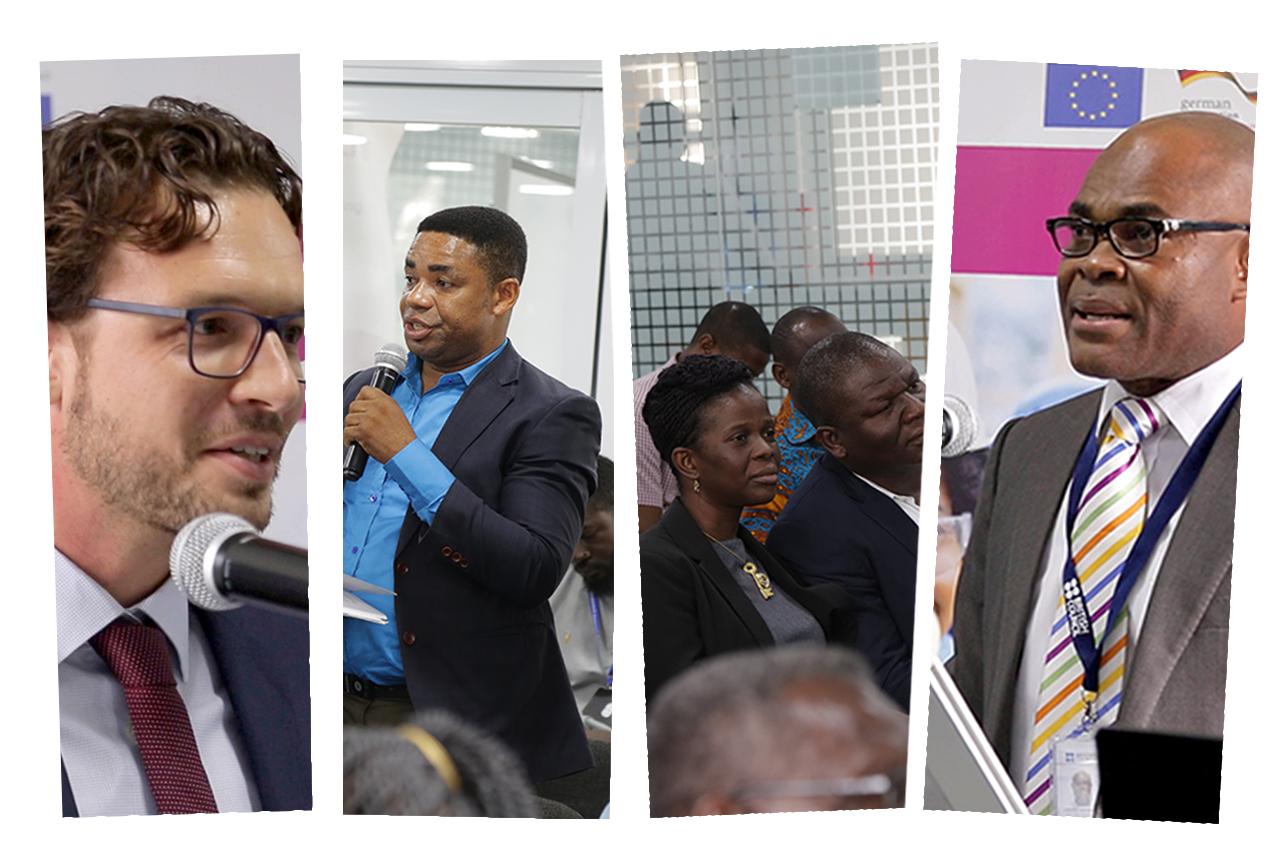
THE VET Toolbox jointly launched in Ghana
Thibaut MONNIER | 03/12/2018
The VET Toolbox was launched in Accra on 27 September 2018. Hosted by British Council in partnership with GIZ, this event was an opportunity for the National Board for Professional and Technician Examinations (NABPTEX) but also for Ghanaian private sector representatives, for Eu delegation in Ghana and for British Council and GIZ representatives to discuss VET reforms and ways to enhance employability for all.Mr Robin Cordes, the Deputy Head of Cooperation, German Embassy, said youth unemployment remained a global problem and an agenda to be pursued as people considered it a time bomb.The world is already feeling the effects with wide spread agitations, unrests and the mass migration of youth from developing countries through dangerous means to Europe in search of jobs. No single country or institution could struggle alone. The implementation of the VET Toolbox will contribute to encourage networking, dialogue and exchange of experiences., he said.Mr Chikodi Onyemerela, the Acting Country Director for British Council, expressed the Bristish Council’s appreciation as one of the implementing agencies of the VET Toolbox, which would help to focus on evidence–based VET and labour market information and improve private sector invlovment in VET.Mr Chikodi Onyemerela added the VET Toolbox is supporting the reform process of the TVET system to built up a highly skilled local workforce for the local industry to contribute to the sustainable development of the country.It will improve the conditions for job creation and job access by supporting demand driven vocational education and training according to the need of the employers and the labour market., he said.Mr Andreas Hoth, VET Expert representing the VET Toolbox partnership during this launch, urged individuals, civil society, private and public institutions who needed o vocational education related support to apply.He said inadequate private sector engagement in such initiative was detrimental to achieving success, hence the VET Toolbox, which made available the much needed expertise and practical advice to partnering countries.VET policies such as labour market intelligence, private sector engagement and support would ensure the inclusiveness of disadvantaged and vulnerable groups for the total development of the workforce., he said.
-
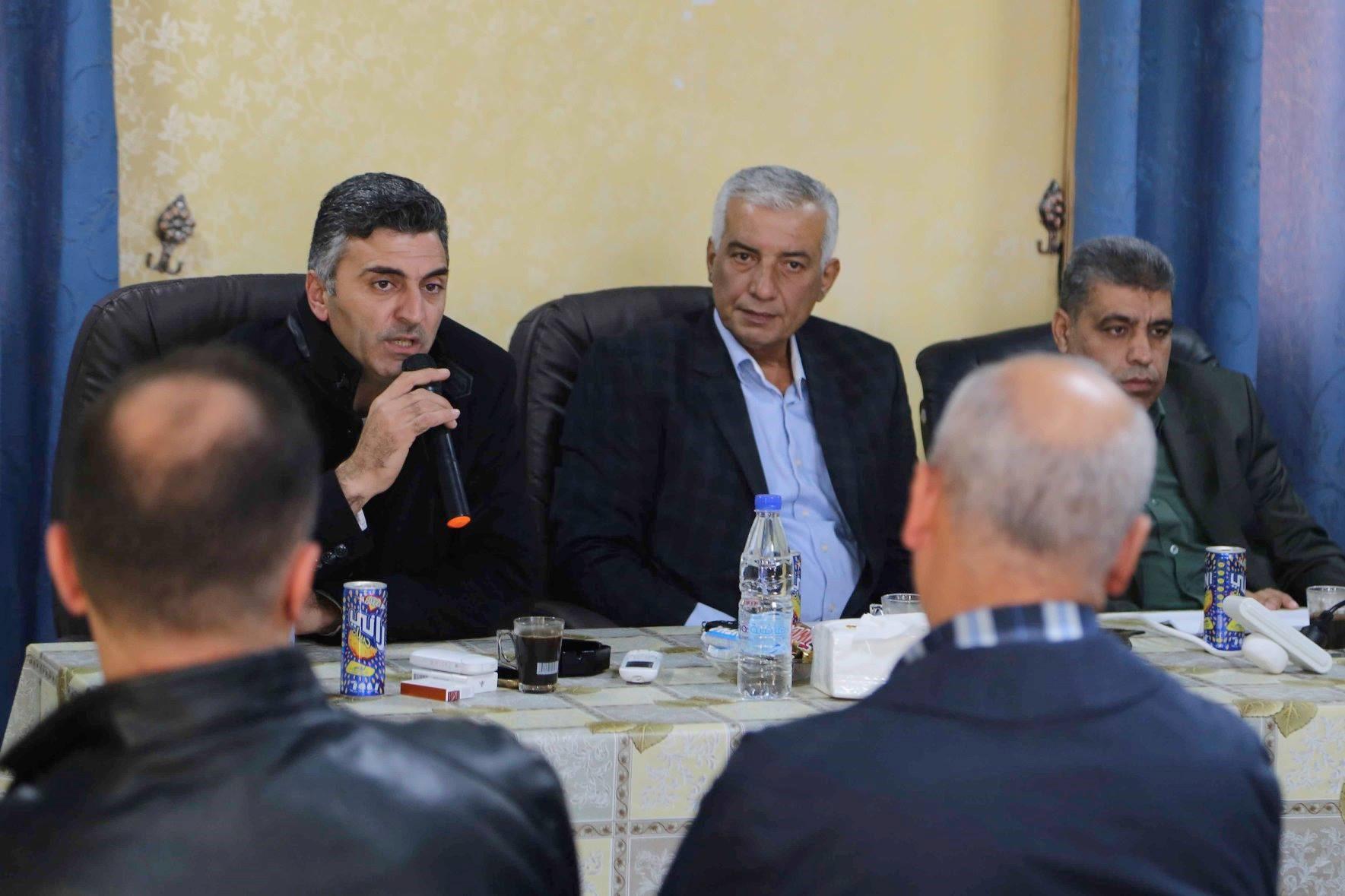
Launch of ARD activities in the Joret Amra cluster
Laura SCHILLEMANS | 28/11/2018
The Joret Amra Cluster in the Qalqilia Governorate launched their ARD initiative (Area Resilience and Development) activities. The cluster consists of 9 communities, of which more than 80% is located in Area C. The launch was attended by local officials and representatives from the Qalqilia Governorate, the Ministry of Local Government, the Municipal Development and Lending Fund, Enabel and the community. A brief about the initiative was presented to the participants to increase their understanding of and commitment to the initiative. The ARD initiative aims to promote the territorial integration process as part of the Territorial Development Policy. The initiative will bring together small communities and territories, creating economically and administratively viable entities. This initiative is part of the Local Government Reform and Development Programme – LGRDPII, implemented by The Ministry of Local Government and The Municipal Development and Lending Fund, funded by the Government of Belgium through the Belgian Development Agency – Enabel.
-
Stepping into synergy: joint planning for capacity strengthening in the energy sector of Mozambique
Anke VANDEVELDE | 28/11/2018
By A.Van de Velde and E.Waeterloos, Enabel MaputoIn September 2018, national and provincial staff of the Mozambican partners Ministry of Mineral Resources and Energy (MIREME), Energy Regulating Authority (ARENE), and the Energy Fund FUNAE retreated with Enabel staff to a quiet venue outside Maputo for a first joint planning exercise.The support of Enabel to the energy sector in Mozambique dates back to 2010. The first Renewably Energy for Rural Development (RERD) project aimed at increasing access to water, solar and wind energy for off-grid applications in more remote rural areas. In 2017, when this collaboration came to an end, Belgium and Mozambique signed two new energy projects to contribute to the socioeconomic development of the rural areas through access to sustainable, affordable and environment-friendly energy for productive use. The first new project is the second phase of RERD, which aims to further invest in renewable off-grid energy systems and suitable management approaches. The other project envisages specifically to strengthen the capacity of MIREME at national and provincial level and of ARENE.Belgium is not the only and certainly not the major donor who supports the energy sector in Mozambique. In order to align the various donors’ contributions, Enabel organised in July 2018 a first workshop in collaboration with MIREME and the Energy Sector Working Group, the dialogue platform between donors and government. This workshop reviewed the sector’s challenges and needs, and updated information on donor commitments to stimulate the discussion around complementarity. The information presented was gathered and analysed by Enabel staff. This exercise was a first attempt at clarifying the priority needs and financial flows of MIREME, ARENE and FUNAE for the next years. It will be followed by other updating and coordination meetings within the Energy Sector Working Group. Enabel continues to engage itself as part of the capacity strengthening intervention to MIREME in such sharing of general information and tentative analyses to promote better alignment between donor projects and development support needs.The EuropeAid Toolkit for Capacity Development of 2010 views capacity development as an internal process of change which takes place within people, organisations or society to unleash, create, adapt, and strengthen their ability to manage their affairs successfully. Such change can take place in different fields such as knowledge, skills, management style, tools, or processes. The most important aspect, however, is that the change needs to happen within the organisations or individuals and needs to be owned by them. An external partner can merely support the process or help to create awareness and incentives for change. Such supportive role is indeed set aside for the Enabel project team. More than in a mere technical cooperation project, strong links and collaboration with the MIREME and ARENE are required to ensure that the process of change is aligned to the country’s agenda and strategy, and fully owned by the government partners. This implies that both cooperation partners need to find a harmonized tune and rhythm to act on. Stepping into the arena to establish the point of departure and seeking synergies in tunes was the objective of the joint planning and baseline workshop which took place from 13 to 14 September 2018.The workshop brought together staff from MIREME at the central level and from the provinces of Sofala, Manica and Zambezia, from ARENE, FUNAE and Enabel to discuss and update the logical and M&E framework of the capacity building project. Before tackling the update, Enabel’s Evert Waeterloos introduced the concepts of capacity development and Theory of Change (what is change, how to change and why?), as well as an elaborate SWOT analysis of the energy sector in Mozambique. This SWOT (strengths, weaknesses, opportunities and threats) analysis was compiled from different secondary data sources[1] and supplemented with a CAF assessment to obtain a more profound analysis of the energy sector. CAF stands for the European Union’s Common Assessment Framework for public sector organisations and is a self-assessment and quality management instrument specifically tailored for and developed by the public sector itself. The CAF model allowed the analysis of the SWOT information according to the following ‘enablers’ or managerial practices of an organisation: leadership, people, strategy and planning, partnerships and resources, and processes[2]. Apart from these five enablers (‘how an organisation does what?’), CAF pays attention to four result-criteria (“what an organisation achieves”): key performance results, citizen or customer oriented results, human resources and social responsibility. Integrating a CAF perspective into the SWOT allows a better identification of the weight and role within the organisation of the various strengths, weaknesses, opportunities and threats. This combined SWOT-CAF analysis provided participants with an overview of the sector and organisations they work in in terms of what is going well?; which aspects will enable change?; what is not working?; which elements need to change?; and which roles are cut out for whom in this? The analysis functioned as a database and a mental reminder during the discussions on updating the logical framework and specification of priorities, activities, targets and stakeholders.Participants were divided in two discussion groups: one focussing more on a central level perspective, and one on a more provincial one. The topic of the discussion were the three result areas of the project: strengthen the capacity of the central level (MIREME), the provincial level (DIPREME) and the new energy regulator ARENE. The groups were asked to identify the most appropriate indicators, targets, activities, time frames and responsibles, and focused on the following aspects: harmonized planning, data and information, human resources, regulatory instruments, and technical assistance and consultancies. Although challenging in the beginning, eventually the discussions proved productive for most of the participants in terms of information about the ambit of capacity strengthening in general and the project in particular, exposure to other perspectives and ideas, and the push to further specify results and activities beyond the daily routine. This exercise provided a first update of the logical framework, and was further refined in October 2018 in the margins of the Climate Days in Brussels with the help of consultants from MDF and staff members from MIREME and Enabel.Capacity development viewed as an internal process of change within the partner towards a better ability to manage one’s affairs successfully, requires an embedded and gradual approach of change in areas such as behaviour, knowledge, tools and processes. In this first year, Enabel and its partners of the energy sector in Mozambique have stepped into the arena and started sounding and developing synergetic tunes through a donor alignment and joint planning and baseline workshop. These can be seen as the first steps in the capacity building process, with the next one the approval and implementation of the elaborated logical results and M&E framework. The latter foresees regular moments for feed-back and adaptation, since supporting change is a dynamic undertaking which can be hardly fixated within one moment in time of planning and monitoring. [1] GOM (2018) Estratégia Nacional De Electrificação; AfDB (2015) Green Growth Mozambique Policy Review and Recommendations For Action; BTC (2016) Dossier Técnico e Financeiro Capacitação Institucional do Ministério dos Recursos Minerais e Energia (Mireme) e Do Conselho Nacional De Electricidade (Cnelec) Moçambique Moz 14 030 11; BT (2017) Ficha Técnica & Financeira Energias Renováveis Para O Desenvolvimento Rural Fase 2 (RERD2) Moçambique; ALER (2017) Energias Renováveis em Moçambique – Relatório Nacional do Ponto de Situação (Segunda Edição) Renewables in Mozambique – National Status Report (Second Edition)
